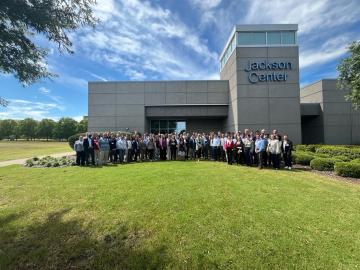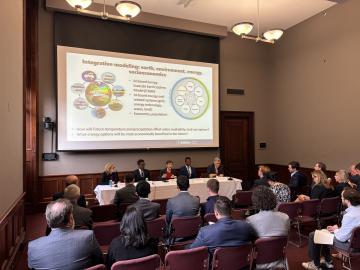
Filter News
Area of Research
- Advanced Manufacturing (4)
- Biology and Environment (12)
- Computational Engineering (1)
- Computer Science (4)
- Energy Science (22)
- Fusion and Fission (6)
- Fusion Energy (6)
- Isotopes (20)
- Materials (30)
- National Security (16)
- Neutron Science (7)
- Nuclear Science and Technology (17)
- Nuclear Systems Modeling, Simulation and Validation (1)
- Quantum information Science (1)
- Supercomputing (29)
News Type
News Topics
- (-) Advanced Reactors (25)
- (-) Composites (21)
- (-) Cybersecurity (17)
- (-) Exascale Computing (52)
- (-) Isotopes (38)
- (-) Machine Learning (51)
- (-) Molten Salt (7)
- (-) Physics (38)
- (-) Space Exploration (23)
- 3-D Printing/Advanced Manufacturing (89)
- Artificial Intelligence (92)
- Big Data (62)
- Bioenergy (84)
- Biology (100)
- Biomedical (53)
- Biotechnology (28)
- Buildings (50)
- Chemical Sciences (48)
- Clean Water (30)
- Computer Science (153)
- Coronavirus (30)
- Critical Materials (17)
- Education (2)
- Emergency (4)
- Energy Storage (64)
- Environment (164)
- Fossil Energy (7)
- Frontier (45)
- Fusion (47)
- Grid (54)
- High-Performance Computing (93)
- Hydropower (12)
- Irradiation (2)
- ITER (7)
- Materials (87)
- Materials Science (89)
- Mathematics (11)
- Mercury (10)
- Microelectronics (3)
- Microscopy (34)
- Nanotechnology (29)
- National Security (63)
- Neutron Science (109)
- Nuclear Energy (85)
- Partnerships (37)
- Polymers (18)
- Quantum Computing (39)
- Quantum Science (59)
- Security (17)
- Simulation (51)
- Software (1)
- Statistics (3)
- Summit (48)
- Transportation (66)
Media Contacts

A research team led by the University of Maryland has been nominated for the Association for Computing Machinery’s Gordon Bell Prize. The team is being recognized for developing a scalable, distributed training framework called AxoNN, which leverages GPUs to rapidly train large language models.

A team of researchers used the Frontier supercomputer and a new methodology for conducting a genome-wide association study to earn a finalist nomination for the Association for Computing Machinery’s 2024 Gordon Bell Prize for outstanding

A multi-institutional team of researchers led by the King Abdullah University of Science and Technology, or KAUST, Saudi Arabia, has been nominated for the Association for Computing Machinery’s 2024 Gordon Bell Prize for Climate Modelling.

Oak Ridge National Laboratory researchers are using a new bioderived material to 3D print custom roosting structures for endangered bats.

Researchers used the Summit supercomputer at ORNL to answer one of fission’s big questions: What exactly happens during the nucleus’s “neck rupture” as it splits in two? Scission neutrons have been theorized to be among those particles emitted during neck rupture, although their exact characteristics have been debated due to a lack of conclusive experimental evidence of their existence.

Researchers led by the University of Melbourne, Australia, have been nominated for the Association for Computing Machinery’s 2024 Gordon Bell Prize in supercomputing for conducting a quantum molecular dynamics simulation 1,000 times greater in size and speed than any previous simulation of its kind.

ORNL and NASA co-hosted the fourth iteration of this invitation-only event, which brings together geospatial, computational, data and engineering experts around a theme. This year’s gathering focused on how artificial intelligence foundation models can enable geospatial digital twins.

To bridge the gap between experimental facilities and supercomputers, experts from SLAC National Accelerator Laboratory are teaming up with other DOE national laboratories to build a new data streaming pipeline. The pipeline will allow researchers to send their data to the nation’s leading computing centers for analysis in real time even as their experiments are taking place.

ORNL researchers were honored with a prestigious ACE Award for Composites Excellence by the American Composites Manufacturers Association. The team won the “innovation in green composites design” prize for creating a fully recyclable, lightweight wind turbine blade tip that incorporates low-cost carbon fiber and conductive coating for enhanced protection against lightning strikes.

Prasanna Balprakash, director of AI programs for ORNL, discussed advancing climate and weather research through high performance computing and artificial intelligence as part of a September 18 panel for the United States Senate.


